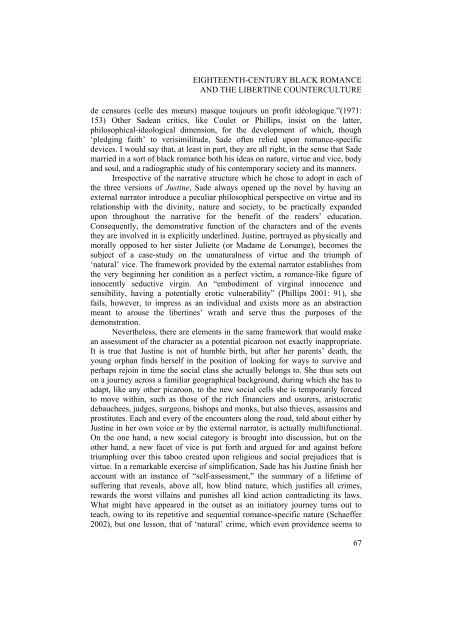culture, subculture and counterculture - Facultatea de Litere
culture, subculture and counterculture - Facultatea de Litere
culture, subculture and counterculture - Facultatea de Litere
You also want an ePaper? Increase the reach of your titles
YUMPU automatically turns print PDFs into web optimized ePapers that Google loves.
EIGHTEENTH-CENTURY BLACK ROMANCE<br />
AND THE LIBERTINE COUNTERCULTURE<br />
<strong>de</strong> censures (celle <strong>de</strong>s mœurs) masque toujours un profit idéologique.”(1971:<br />
153) Other Sa<strong>de</strong>an critics, like Coulet or Phillips, insist on the latter,<br />
philosophical-i<strong>de</strong>ological dimension, for the <strong>de</strong>velopment of which, though<br />
‘pledging faith’ to verisimilitu<strong>de</strong>, Sa<strong>de</strong> often relied upon romance-specific<br />
<strong>de</strong>vices. I would say that, at least in part, they are all right, in the sense that Sa<strong>de</strong><br />
married in a sort of black romance both his i<strong>de</strong>as on nature, virtue <strong>and</strong> vice, body<br />
<strong>and</strong> soul, <strong>and</strong> a radiographic study of his contemporary society <strong>and</strong> its manners.<br />
Irrespective of the narrative structure which he chose to adopt in each of<br />
the three versions of Justine, Sa<strong>de</strong> always opened up the novel by having an<br />
external narrator introduce a peculiar philosophical perspective on virtue <strong>and</strong> its<br />
relationship with the divinity, nature <strong>and</strong> society, to be practically exp<strong>and</strong>ed<br />
upon throughout the narrative for the benefit of the rea<strong>de</strong>rs’ education.<br />
Consequently, the <strong>de</strong>monstrative function of the characters <strong>and</strong> of the events<br />
they are involved in is explicitly un<strong>de</strong>rlined. Justine, portrayed as physically <strong>and</strong><br />
morally opposed to her sister Juliette (or Madame <strong>de</strong> Lorsange), becomes the<br />
subject of a case-study on the unnaturalness of virtue <strong>and</strong> the triumph of<br />
‘natural’ vice. The framework provi<strong>de</strong>d by the external narrator establishes from<br />
the very beginning her condition as a perfect victim, a romance-like figure of<br />
innocently seductive virgin. An “embodiment of virginal innocence <strong>and</strong><br />
sensibility, having a potentially erotic vulnerability” (Phillips 2001: 91), she<br />
fails, however, to impress as an individual <strong>and</strong> exists more as an abstraction<br />
meant to arouse the libertines’ wrath <strong>and</strong> serve thus the purposes of the<br />
<strong>de</strong>monstration.<br />
Nevertheless, there are elements in the same framework that would make<br />
an assessment of the character as a potential picaroon not exactly inappropriate.<br />
It is true that Justine is not of humble birth, but after her parents’ <strong>de</strong>ath, the<br />
young orphan finds herself in the position of looking for ways to survive <strong>and</strong><br />
perhaps rejoin in time the social class she actually belongs to. She thus sets out<br />
on a journey across a familiar geographical background, during which she has to<br />
adapt, like any other picaroon, to the new social cells she is temporarily forced<br />
to move within, such as those of the rich financiers <strong>and</strong> usurers, aristocratic<br />
<strong>de</strong>bauchees, judges, surgeons, bishops <strong>and</strong> monks, but also thieves, assassins <strong>and</strong><br />
prostitutes. Each <strong>and</strong> every of the encounters along the road, told about either by<br />
Justine in her own voice or by the external narrator, is actually multifunctional.<br />
On the one h<strong>and</strong>, a new social category is brought into discussion, but on the<br />
other h<strong>and</strong>, a new facet of vice is put forth <strong>and</strong> argued for <strong>and</strong> against before<br />
triumphing over this taboo created upon religious <strong>and</strong> social prejudices that is<br />
virtue. In a remarkable exercise of simplification, Sa<strong>de</strong> has his Justine finish her<br />
account with an instance of “self-assessment,” the summary of a lifetime of<br />
suffering that reveals, above all, how blind nature, which justifies all crimes,<br />
rewards the worst villains <strong>and</strong> punishes all kind action contradicting its laws.<br />
What might have appeared in the outset as an initiatory journey turns out to<br />
teach, owing to its repetitive <strong>and</strong> sequential romance-specific nature (Schaeffer<br />
2002), but one lesson, that of ‘natural’ crime, which even provi<strong>de</strong>nce seems to<br />
67












